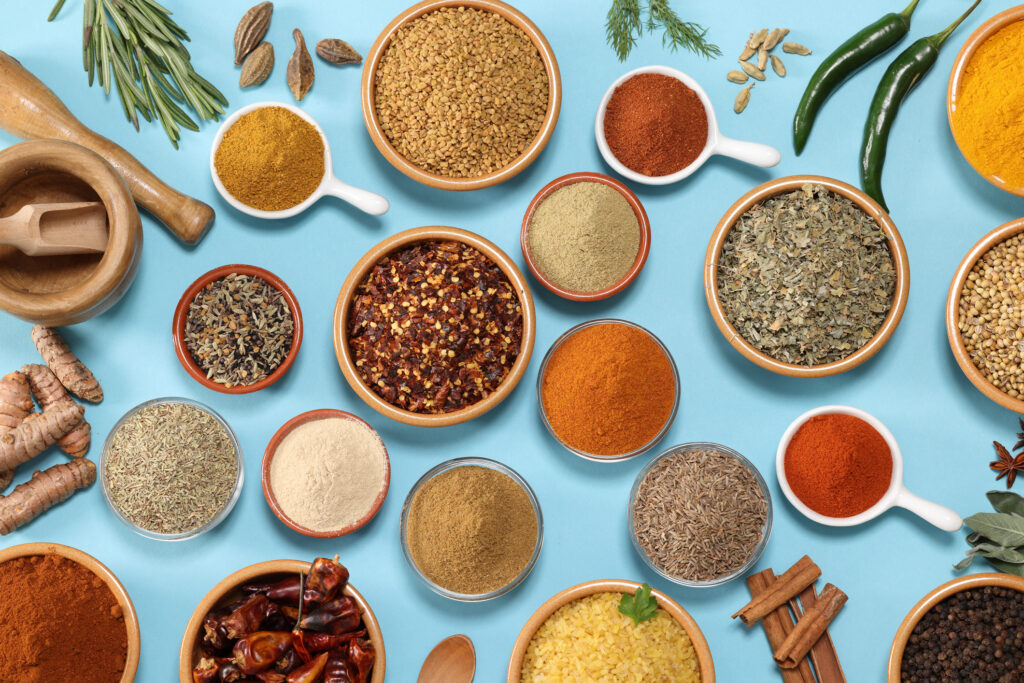The seasons are changing – and so is our appetite! You may be less inclined to crave light, summery foods like salads, and longing for cosy, comfort food – like a delicious curry!
Curries often have a bad reputation as they can be heavy on ingredients like cream and butter. However, the key ingredients in most curry recipes are actually great for your health! Curries are also a brilliant opportunity to pack in a load of fibre-rich foods and vegetables in one go.
Here are some of those key ingredients and what makes them so good for you:
Sweet Potatoes
- Sweet potatoes are a carbohydrate-rich, easy-to-digest, fibre-rich whole food.
- They are an excellent source of both soluble and insoluble fibre which makes them great for our digestive health.
- They are a great source of beta carotene (vitamin A) – this is what gives them their bright orange colour. Vitamin A is important for various reasons, from supporting eye health and strengthening the lining of your gut to supporting your immune system so it’s better at fighting off illnesses.
- They are a good source of vitamin C which protects cells and maintains healthy skin, bones and cartilage.
- This root veg is also a rich source of some B vitamins, such as vitamin B6, which makes haemoglobin and allows the body to turn carbs and protein into energy.
Lentils
- Great source of low GI (glycemic index) carbohydrates and protein1 https://www.mdpi.com/1424-8247/15/10/1225. Half a cup of cooked lentils provides a whopping 12g of protein – perfect for vegetarians and vegans.
- Lentils are abundant in dietary fibre at 8g per 100g cooked.
- They are also a fantastic source of iron. You can get 15% of your daily iron requirements from just half a cup of cooked lentils.
- Excellent source of folate which is important in red blood cell formation and for healthy cell growth and function.
- Their phenolic compounds are effective inhibitors of enzymes which are involved in digestion. This also helps to control blood sugar levels.
- Studies on the biological effects of lentil polyphenols reveal that they may have substantial anti-oxidant properties.
- Evidence indicates that eating lentils on a regular basis may significantly reduce the risk of cardiovascular diseases including type 2 diabetes2 http://www.mdpi.com/1422-0067/18/11/2390, 3(http://archinte.jamanetwork.com/article.aspx?doi=10.1001/2013.jamainternmed.70)
Turmeric
- Turmeric contains many beneficial compounds – the most commonly known, and researched, is a polyphenol called curcumin4https://www.nccih.nih.gov/health/turmeric
- Curcumin, as well as other compounds in turmeric, has many health-giving properties including anti-oxidant5https://pubmed.ncbi.nlm.nih.gov/26528921/, antimicrobial 6https://www.sciencedirect.com/science/article/pii/S2213716519302590), and antiplatelet 7https://pubmed.ncbi.nlm.nih.gov/22531131/.
- Turmeric is also known for its strong anti-inflammatory and pain-reducing characteristics. A review of randomized clinical trials supports the efficacy of turmeric extract in the treatment of arthritis 8https://www.ncbi.nlm.nih.gov/pmc/articles/PMC5003001/
- Turmeric is also a great source of vitamin C, calcium, iron, potassium and zinc.
Ginger
- The active compounds in ginger are called gingerols. Research suggests that these have antioxidant, antimicrobial, anti-inflammatory and anti-allergenic properties9https://www.ncbi.nlm.nih.gov/pubmed/26228533
- Research shows that ginger could stimulate a number of digestive enzymes, speeding up the time it takes our body to process food, which could help prevent conditions such as constipation 10https://www.ncbi.nlm.nih.gov/pubmed/15218978.
- Ginger reduces the production of various chemicals in the body, including leukotrienes, that trigger joint inflammation11https://www.versusarthritis.org/about-arthritis/complementary-and-alternative-treatments/types-of-complementary-treatments/ginger/
- Ginger can relieve nausea12https://www.ncbi.nlm.nih.gov/pubmed/10793599.
- Ginger may be effective at relieving period pain 13https://www.ncbi.nlm.nih.gov/pubmed/19216660.
Garlic
- Contains many unique phytonutrients, minerals, vitamins, and antioxidants that have proven health benefits.
- Garlic is excellent for immunity. Studies suggest garlic can help combat the common cold and flu 14https://pubmed.ncbi.nlm.nih.gov/11697022/.
- Numerous studies have proven garlic’s antibiotic properties15https://www.ncbi.nlm.nih.gov/pmc/articles/PMC4458355/ due to the bioactive compounds. So much so that it has been shown to fight various bacteria, viruses, and fungi.
- A 2018 meta-analysis16https://journals.lww.com/md-journal/fulltext/2018/05040/anti_hyperlipidemia_of_garlic_by_reducing_the.3.aspx revealed that garlic has “antihyperlipidemic ability”, meaning it is great for cholesterol health.
- Garlic has also been shown to reduce inflammation in the body, helping alleviate chronic pain 17https://pubmed.ncbi.nlm.nih.gov/32478922/
- Garlic lowers the risk of certain cancers, likely due to its antioxidant properties18(https://onlinelibrary.wiley.com/doi/abs/10.1111/ajco.13133, 19https://www.ncbi.nlm.nih.gov/pmc/articles/PMC6737461/).
Chillies
- Chillies’ nutritional profile contains vitamin C, B, K and A. Chillies are also a copper and potassium source.
- Chilies contain an alkaloid compound, capsaicin, that gives them a strong spicy, and pungent character. Early laboratory studies on experimental mammals suggest that capsaicin has anti-bacterial, anti-carcinogenic, analgesic, and anti-diabetic properties. 20https://www.ncbi.nlm.nih.gov/pmc/articles/.
Read more about the benefits of herbs and spices here.
Any questions? Contact one of our Nutritional Therapists via live chat, weekdays from 8 am to 8 pm.
Advice given is not intended to be a substitute for professional medical advice, diagnosis, or treatment. Always check with your GP for interactions with medications/health conditions before starting supplements.
References
- 1
- 2
- 3
- 4
- 5
- 6
- 7
- 8
- 9
- 10
- 11
- 12
- 13
- 14
- 15
- 16
- 17
- 18
- 19
- 20














